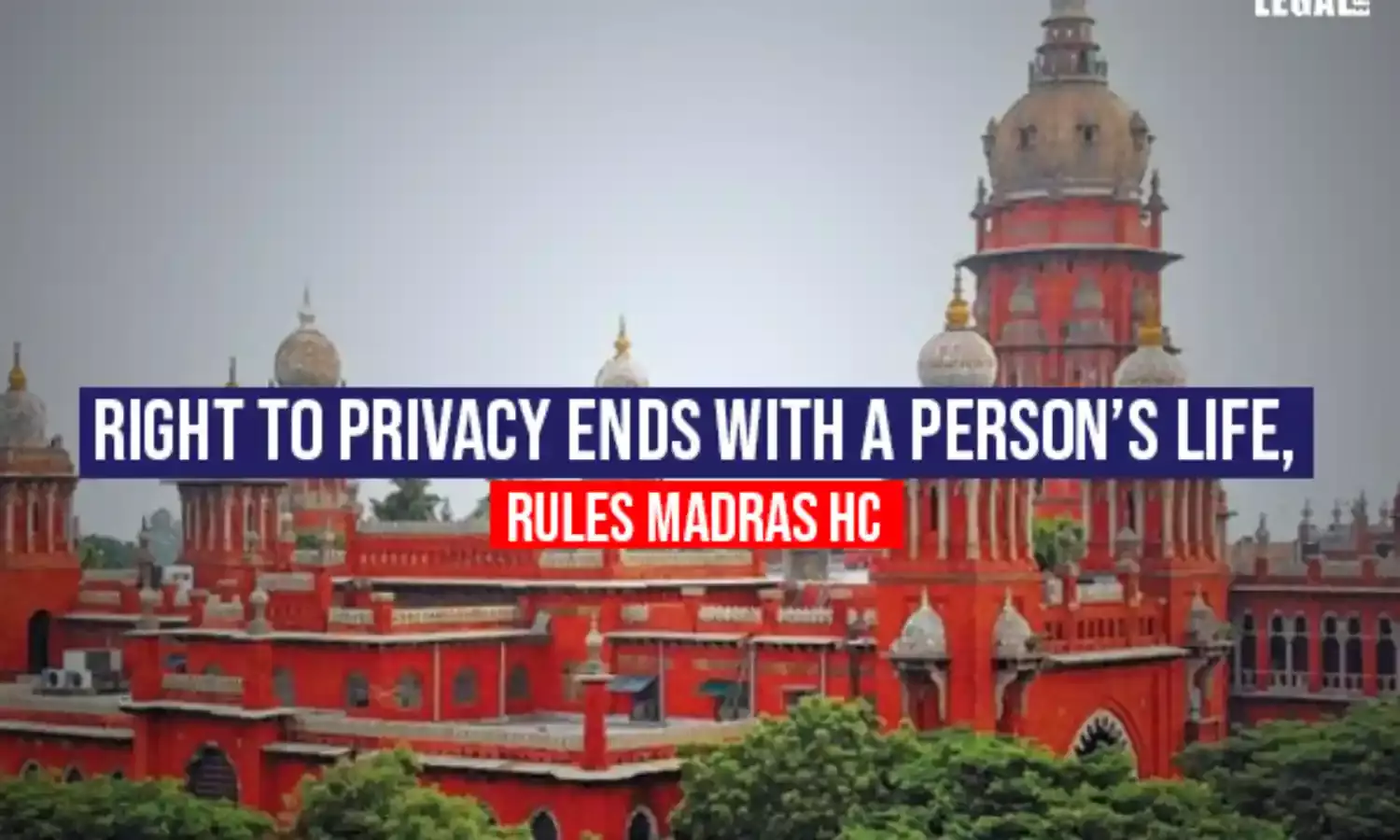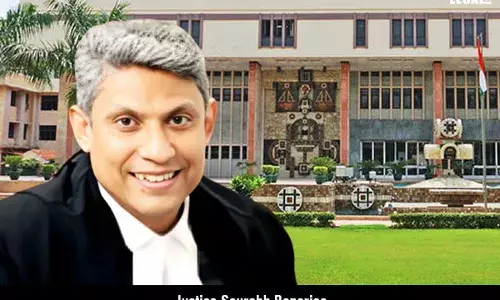"Right of privacy of an individual" cannot be inherited after his or her death by his legal heirs: Madras High Court
The Madras High Court has ruled that the right to privacy and reputation which a person earns during the lifetime extinguishes;

"Right of privacy of an individual" cannot be inherited after his or her death by his legal heirs: Madras High Court The Madras High Court has ruled that the right to privacy and reputation which a person earns during the lifetime extinguishes after his/her death. The right to privacy is not like the movable and immovable properties which can be inherited by the legal heirs of the...
"Right of privacy of an individual" cannot be inherited after his or her death by his legal heirs: Madras High Court
The Madras High Court has ruled that the right to privacy and reputation which a person earns during the lifetime extinguishes after his/her death. The right to privacy is not like the movable and immovable properties which can be inherited by the legal heirs of the deceased. Such heirs cannot take the legal route to protect the privacy rights of the deceased.
The bench of Justices R. Subbiah and Sathi Kumar Sukumara Kurup was hearing an appeal filed by Tamil Nadu's former Chief Minister Dr. J. Jayalalitha's niece J. Deepa. The Court dismissed the appeal which was filed after the single judge refused to grant an injunction against the release of Kangana Ranaut and Arvind Swami-starrer Thalaivi.
Deepa (Appellant/Plaintiff) contended that the film was not made by her consent and apprehended that apprehends that while the respondents/defendants portray Dr. J. Jayalalitha and her personal life in the life story, the plaintiff's part in the life story, may also be depicted by the respondents/defendants in their own version, which may affect the family privacy of the appellant/plaintiff. She further contended that the personality rights of her aunt Dr. J. Jayalalitha and the interest of her family's privacy had to be safeguarded. According to her, it was absolutely necessary that, in the absence of any consent and approval of the story, script, screenplay etc., by the appellant/plaintiff, the respondents/defendants should not be permitted to proceed with the production of the said film or web serial or releasing the same for public exhibition.
It was also contended by the Appellant's Counsel that the Appellant being the Class I legal heir (as per Hindu Law) of late. Dr. J. Jayalalitha, she is entitled to institute the present suit to safeguard the "posthumous right of privacy" and to protect the dignity and legacy of her Late aunt Dr. J. Jayalalitha. It was also contended that the Single Judge, had erroneously concluded that the appellant/plainatiff is not a close relative of Dr. J. Jayalalitha and therefore, she cannot exercise any posthumous right on behalf of her Late aunt.
The Respondents on the other hand contended that the film "Thalaivi" will not have single scene portraying the appellant/plaintiff. Thus, the appellant's privacy will not be disturbed and her life is not part of the film.
It was also the contention of the second respondent that he had obtained the right of the book "Thalaivi" in April 2019 for production of the film "Thalaivi". The appellant/plaintiff had not objected for the publication of the book. The said book also depicts the life story of the former Chief Minister and it was registered under the Copy-right Act. Therefore, the question of privacy of the appellant/plaintiff being infringed did not arise, inasmuch as everyone in Tamil Nadu is aware of the life story of Dr. J. Jayalalitha. The matter being in "public domain", the concept of privacy did not arise at all.
The Madras High Court noted, "After the death of a person, the reputation earned cannot be inherited like a movable or immovable property by his or her legal heirs. Such personality, reputation or privacy enjoyed by the person during his/her lifetime comes to an end with his/her death. We are of the opinion that a "posthumous right" is not an "alienable right". Therefore, the appellant is not entitled to an injunction on the ground that the "posthumous right" of her aunt is sought to be sullied by the respondents/defendants by reason of by the release of the film titled Thalaivi."
Justice Subbiah pointed out that the movie was yet to be released and hence, it was too early for the appellant to claim that the makers of the film would cause damage to the reputation of her aunt. The release of the movie is subject to certification by the Central Board of Film Certification and the board will have an opportunity to go through the content of the movie.
Agreeing to the contention being made by the senior counsel representing the director of Thalaivi, the bench noted that there is no obligation on the part of the filmmaker to obtain the appellant's consent before making the movie on her aunt's life.
Quoting Bombay High Court in F.A. Picture International vs. CBFC reported in AIR 2005 Bombay 145, the bench noted, "Artists, film makers and play rights are affirmatively entitled
to allude to incidents which have taken place and to present a version of those incidents, which according to them represents a balanced portrayal of social reality. The Constitutional protection under Article 19(1)(a) that a film maker enjoys is not conditional on the premise that he must depict something which is not true to life. The choice is entirely his."
The Court concluded, "Those who hold important positions must have shoulders which are broad enough to accept with grace a critique of themselves and critical appraisal is the cornerstone of the democracy. The power of the film as a medium of expression lies in its ability to contribute to that appraisal and the filmmaker cannot be compelled to portray only a particular version of the facts in a web-series or in a movie."





